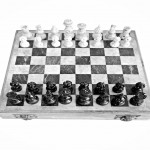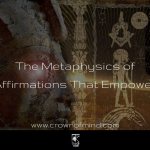Disagreements can evolve you if you allow them.
I met a group of seekers not long ago at a comfortable diner. Their focus, similar to mine, is on realizing personal potential and striking the deepest connection with the source of the universe. They’re lifelong learners.
But just because we have the same goal doesn’t mean we have the same pathways or methodology.
I realized it on that night.
The group’s focus, in my view, is to concentrate strictly on the weaknesses. By finding out what you are not, you eventually realize what you are.
I do see the usefulness in this path. In I Am That, Sri Nisargadatta Maharaj speaks about he came to realize his non-self or, that he wasn’t his body, or his mind, or the identities that people assigned him, or the identities he assigned himself.
Try it yourself:
Say, I am not:
- The “expensive” clothes I just bought
- The valedictorian; it’s a title for an accomplishment
- The occupation I work as
- The industry I work in
- The names people tell me I am
- The ego-identities I’ve assigned to myself
- The body because I use it; it’s useful bio-technology
- The mind because I use it; it’s a useful connector to the universe
Before you were born, you had no label. And when you were born, you started receiving labels. Can the labels be useful? Sure.
But if I am not these things at the root, then who am I? That’s the $1 billion dollar question.
Stripping all of those labels away, we are left with something. That something, which truly has no name (if you name it, you’re creating a label) is the essence of who we are as humans on the earth and in the cosmos.
So, I understand the view.
But I disagreed with some of the approach. Since I believe that where you focus, you give your energy (Qi), consistently concentrating on what I lack will hinder me from directing energy towards my strengths. My brain will think, “lack.” My entire orientation with which I operate in the world will come from a position of lacking, of weakness, of scarcity.
I take the path of abundance.
I believe in not finding out what’s wrong with a person, but how to actualize the potential within. Instead of, “What are you missing?” I say, “What do you have that we can grow?” This is at the heart of my education consulting.
They also had this habit of telling me what I am and what I lacked, and the comments I made note of. Within 1-2 meetings, they explained to me, with declaration, what I didn’t possess inside the core of my being. Whether this was an NLP technique or an attempt to display deep intuition, the conclusions did not resonate with me.
I may never meet them again.
But, the experience was valuable. I engaged it because I wanted to learn their perspectives, and I did without allowing myself to subordinate my personal foundation.
I wish them prosperity and success on their life paths.
From this, we can see that the value of experiencing disagreements show up right in the moment. These are some opportunities to keep your consciousness cap on if you feel the need to “prove your point” while stepping over someone else’s:
- When you feel anger over your point being dismissed. The blood boils. You can feel the rage kicking in and you want to lash out. But stop. This is a chance to soak in what the “opponent” is saying and understand why it’s ticking you off. What triggered your anger? It’s something to pay attention to.
- When you feel like you want to shut the conversation down. This happens often. You hear something you don’t like and all words after that enter through one ear and out of the other, or…you leave the space, completely shutting the talk down. This is an immature option. If you can’t stay in a conversation you disagree with and see it come to a proper end, how will you learn anything new? Are you incapable of disagreeing with someone’s ideas while not being angry at the person? Must you talk only with people who agree with your views? Those are called “yes people.” Finish the conversation and once you’ve heard the content, contemplated on it and see if it fits your paradigm or not, then decide your next move.
- When you’re about to say something you’ll soon regret. We’ve all done it at some point. You become so angry and in the moment of the argument that you say a phrase that changes the nature of the scene. “You make me sick!” “Get out!” “I hate you!” “I’m done!” “That’s it!” “Why’d you do that stupid!” are examples. All of a sudden, you want to take those harmful words back but sometimes it’s too late. The damage was done. This is another immature move that kids and adults do quite often. If you don’t become used to handling disagreements, you’ll end up in this category every time.

As I describe in my upcoming book Sage Mind, you’ll see that emotions are energy pulses. You can self-examine this. The emotion is a rush of energy that “hits” you and it must be expressed. If they grow out of control, we say the emotions “possessed” you. Then when you come out of it you say, “I can’t believe I said that” or, “I wasn’t myself.”
Oh, you were being yourself, but you were “owned” by your emotions.
Fired up with anger or fury.
Full of happiness.
Enraptured by love.
Falling in love.
Taken over by despair.
If you examine the word choice alone, you can see we’re already expressing emotions as possessions. They do something to us for the better or worse. It’s a matter of how you gain awareness, control and mastery of the pulses for your growth.
When those pulses aren’t expressed, we call it suppression. What I’m advocating here is transmutation; transforming those same pulses and putting them towards a learning purpose.
Experiencing disagreements is a vital opportunity to challenge your own learning, add pieces, totally shift it, break it down, recreate it and evolve. Don’t lose the value just because you’ve become too emotional.







[…] professional’s emotional state is instrumental in each step taken towards career […]
[…] When we feel stressed, our bodies also respond to it in many ways, including cortisol release which suppresses our immune system and higher order cognition. This is partly why a person makes “rash” decisions under stress, or says words later regretting and states, “I just wasn’t myself.” […]
[…] They still exhibit parasitic urges but may develop the discipline to not give into them, or transmute them. This is illustrative of people who have the potential to change their parasitic ways and live […]